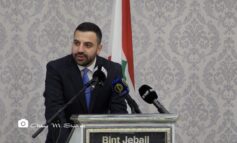
The Israeli cabinet’s decision to strike a prisoner exchange deal with the Hizbullah movement in Lebanon on the eve of the anniversary of the war between the two sides of July 12 August 14, 2006 will not be remembered as one of Israel’s most glorious moments. Even its chief architect, Prime Minister Ehud Olmert, has referred to the deal in terms of “sadness” and “humiliation” while it has been staunchly opposed by the heads of Israel’s internal-security agency (Shin Bet) and foreign-intelligence agency (Mossad), as well as by a number of Israeli politicians across the political spectrum.
Indeed, the exchange, involving five Lebanese prisoners and the remains of hundreds more Lebanese and Palestinians for the remains of two Israeli soldiers whose seizure precipitated the 2006 war), which occurred July 16, 2008, can be described as a replay of what Israel’s own investigative commission into that war regarded as a historic defeat.
True, Israel has made similar deals in the past some involving the release of much larger numbers of prisoners than the five Lebanese to be freed this time. But the very nature of the current exchange, as well as its strategic implications, renders it a zero-sum game in which Israel loses and Hizbullah again emerges triumphant. In implementing it, Israel will effectively fulfill Hizbullah leader Hassan Nasrallah’s “truthful promise” to secure the release of Lebanese prisoners held by Israel (the original aim of the operation Hizbullah carried out on July 12, 2006 when it abducted two Israeli soldiers on the Israel-Lebanon border) and reconfirm his oft-repeated slogan: “just as I always used to promise you victory, now I promise you victory once again.” The overall impact will be to give these popular catchphrases the appearance of strategic foresights.
The balance of advantage
In substance, the deal is both quantitatively and qualitatively lopsided to Hizbullah’s advantage. For in addition to the release of four Lebanese fighters captured during the 2006 war, Hizbullah has wrung from Israel the emancipation of Lebanon’s longest-serving Israeli prisoner, Samir Kuntar, who has been in jail since 1979 for his role in killing an Israeli man, his four-year-old daughter and a policeman. The symbolic value of Kuntar’s release for Hizbullah which has described him as “chief of the Arab and Lebanese prisoners” cannot be overstated; his status as cause celebre among many Lebanese was secured in 2004 when Israel described him as a human “bargaining-chip” who could be released in return for information about the fate of Israel’s missing airman, Ron Arad.
In the event, the detailed report Hizbullah submitted on July 13, 2008 about what happened to Arad is confined to its own investigations into his disappearance and reportedly has declared him dead without locating the whereabouts of his remains (see Amos Harel and Yossi Melman, “Israel transfers report on Arad,” Haaretz, 13 July 2008). Moreover, the way the Israeli media has been depicting the issue suggests that the quid pro quo for the Arad report is an Israeli report on the fate of the four Iranian diplomats who were kidnapped (and presumably murdered) during Israel’s invasion of Lebanon in 1982.
The real trade-off regarding Samir Kuntar seems now to be with the two Israeli soldiers abducted on 12 July 2006, Ehud Goldwasser and Eldad Regev thus granting the two a clear precedence over the once iconic Arad. The widespread assumption that the two soldiers are dead would mean that Israel will soon be receiving “dead soldiers” in exchange for “live terrorists” a severe blow to Israel’s national pride. But whether its soldiers prove to be dead or alive on July 16-17, the release of Samir Kuntar will mean that Israel will have broken with its longstanding policy of refusing to free prisoners with “Israeli blood on their hands.”
This policy reversal has emboldened Hamas, whose former foreign minister Mahmoud al-Zahar calls on the movement to exploit the Kuntar decision in negotiations with Israel over the release of Gilad Shalit, the Israeli soldier seized by Hamas on 25 June 2006. Shin Bet’s decision in June 2008 to approve the release of Palestinian prisoners in exchange for Shalit provided they are no longer seen as posing a security risk reveals Israel’s growing vulnerability in the face of movements like Hizbullah and Hamas.
Another indication of Israel’s decreased bargaining power vis-a-vis the two groups is its reluctant approval to the freeing of an as yet unspecified number of Palestinian prisoners as part of the Hizbullah deal. If this will contravene the Kadima party minister Yaakov Edri’s vow that “there is no way we will release Palestinians,” there is no reason to doubt Nasrallah’s description of this aspect of the negotiations as being “the most difficult.”
The precise number of Palestinian prisoners to be released may still be in doubt (though if either Goldwasser or Regev is alive, it can safely be assumed that Hizbullah will exact an even higher price in this respect); but in any event this concession is especially damaging to Israel. Such a capitulation serves both to consecrate Hizbullah’s image in the Arab world as the standard-bearer of Palestinian rights, and to raise Hamas’s price for Shalit’s release from 450 to 1,450 Palestinian prisoners especially given that the IDF soldier is certifiably alive.
The ingredients of failure
If the deal’s substance is hard enough for Israel, its strategic implications are also a major cause of concern, on four grounds. First, the prisoner-exchange constitutes a tacit admission of Israel’s responsibility for the July-August 2006 war, which wreaked mass destruction on Lebanon and resulted in the deaths of more than 1,200 (mainly civilian) Lebanese. Israel had rationalized its war as a response to Hizbullah’s abductions, while Nasrallah has insisted all along that his movement sought nothing more than a prisoner-exchange with Israel.

Israel’s agreement to such a swap now, after resolutely refusing it for so long, has exposed its use of the abductions as a pretext to launch a premeditated war against Hizbullah in an attempt to dismantle its military infrastructure. Second, the exchange deal as well as establishing Israel’s responsibility for the 2006 war confirms the Winograd Commission’s assessment of Israel’s defeat in it. Its formidable military machine failed then both to eliminate Hizbullah’s military capacity and to win the unconditional release of its two prisoners. Nasrallah had accurately predicted as much on the very day of the abductions, when he famously told a press conference: “These prisoners that we hold will never go home except in one way: indirect negotiations and exchange,” not even if “the entire world” attempted to rescue them. At the time, Olmert dismissed Nasrallah’s warning and scoffed at his exchange proposal, declaring that Israel “will not be blackmailed and will not negotiate the lives of our soldiers with terrorist organizations.”
That same week, Olmert reinforced the point with a similarly forceful and seemingly irrevocable pledge regarding Gilad Shalit: “I don’t negotiate with Hamas, I did not negotiate with Hamas and I will not negotiate with Hamas.” Nasrallah, who prides himself on understanding the Israeli politico-military psyche, anticipated such bombast on July 12, 2006: “At first [the Israelis] say no, but then they accept. This may take place after a week, a month or a year, but finally they will let us negotiate.”
Third, in agreeing to the deal Israel cannot seek solace in the fact that it is submitting to the will of the international community or the diktat of international law. The prisoner-exchange will be conducted under the auspices of the United Nations; but it bears recalling that U.N. Security Council Resolution 1701 (which ended the war on August 14, 2006) while appealing for an “urgent settling” of the issue of the Lebanese prisoners adopted Israel’s idiom by stipulating the “unconditional release of the abducted Israeli soldiers” (rather than calling for a swap). In this manner, Hizbullah appears to have succeeded in defying not only Israel, but the will of the international community as well.
Fourth, by recognizing Hizbullah rather than the Lebanese government as its negotiating partner, Israel has inadvertently undermined the latter and thus further exacerbated its own position. Hizbullah’s own response to criticism within Lebanon of its priority in this respect (such as from the politician Amin Gemayel) has always been that no Lebanese government has ever sought the release of Lebanese prisoners through diplomatic means; a case in point is the current government of Fouad Siniora, which has not used the diplomatic leverage it enjoys with the U.S. and Europe to resolve the prisoner issue. The result is that Hizbullah emerges as the force in Lebanon that can deliver, thereby perpetuating an important political dynamic of the non-state actor which functions as the de facto state versus the state non-actor which merely enjoys the status of de jure state.
This distinction in part answers the question raised by a leading member of Lebanon’s governing March 14 faction, the Druze leader Walid Jumblatt: “How is it that some of us [in Lebanon] have the right to conduct negotiations for the return of prisoners, to conduct negotiations with Israel,” while the state if it engages in similar negotiations is “accused of collaborating with the enemy”? The key point is that the Lebanese de jure state, without a defensive strategy or policy, lacks the power (vis-a-vis its enemies) and the moral authority (over a significant segment of Lebanon’s population) to negotiate deals of this kind, least of all with a foe as militarily superior and popularly anathematized as Israel. If the Lebanese state, in its current capacity, were to negotiate directly or indirectly with Israel, it would be the result of U.S.-Israeli pressure to do so; whereas groups like Hizbullah and Hamas are engaged in such negotiations because they have forced Israel to submit to them.
The logic of force
Indeed, a wider outcome of the current prisoner exchanges with Hizbullah and Hamas is confirmation of the truism that Israel “only understands the logic of force.” Hizballah has repeatedly made this argument in attributing the liberation of Lebanese and Palestinian territory to resistance activity, while decrying the futility of diplomacy with Israel in retrieving prisoners or land. A senior official of the Palestinian Authority echoed it recently in reproaching Israel for “showing that force is the only language you understand every time Hizbullah fights you, kidnaps soldiers [sic] and then has all its demands met. Nasrallah brings Israel to its knees every time, and how do you respond? You bring [Palestinian Authority president] Abu Mazen to his knees.”
Israel’s surrender to this logic is fraught with risk. By establishing anew the links between abductions and prisoner-exchange, between armed struggle and liberation of occupied territory, Israel sets itself up for renewed confrontation with its enemies. Against continued predictions that the closure of Hizbullah’s “liberation file” (after prisoner releases, and the recovery by Lebanon of the disputed Shebaa farms territory) will strip Hizbullah of any pretext to retain its arms, the prisoner-exchange serves rather to vindicate the group’s rationale for its armed status.
Hizbullah clearly sees itself as continuing to play an indispensable role in what Hassan Nasrallah calls an effective “national defense strategy.” The party’s former energy minister Mohammad Fneish echoes the point with reference to the group’s achievement in securing the current deal: “when assessing future dangers we must agree that the resistance fulfills a necessity in its readiness, the experience of its fighters and commanders.”
Hizbullah has sought to make the prisoner deal serve as a politically unifying factor by hailing it as a victory for the entire Lebanese nation. Nasrallah reached out to the party’s erstwhile political rivals to this effect in a speech on July 2, 2008. At the time of writing, the leading figures of the March 14 pro-government camp have pledged to attend the welcoming ceremony of the Lebanese prisoners; prime minister Fouad Siniora has vowed to make the day a national holiday.
Moreover, Nasrallah’s presentation of the deal as making Lebanon “the first Arab country involved in the Arab-Israeli dispute” to resolve issues of prisoners, fighters’ remains and the missing-in-action also reverberates in the wider Arab world. This also enables Hizbullah to engage in some much needed damage-control after its involvement in the inter-sectarian clashes of May 2008. The fact that Kuntar is not a member of Hizbullah but belongs to the Druze community, which is commonly identified with the March 14 camp, will if anything facilitate this process.
The cost of weakness
A significant aspect of the upcoming prisoner-swap is Hizbullah’s ability to appropriate for itself the moral standard (which Israel has long proclaimed when making asymmetrical prisoner exchanges with Arab resistance groups) of acting in accordance with “human value and dignity.” Nasrallah alluded to this in his July 2 speech when he defended the movement’s image as “civilized and humanitarian” owing to its “respect for man and for man’s value and dignity,” and scorned the British government’s portrayal of the resistance a “terrorist” organization. As professed by Fneish: “We have returned respect for the value of humanity a respect stripped away by the formal Arab order.”
The party’s memorialization of its dead fighters, the longstanding campaigns it has waged to retrieve its prisoners and the military actions and diplomatic initiatives it has taken to retrieve them, have underscored how valuable its living and dead fighters are to it and begun to pay real political dividends. In this too, Hizbullah has seized the initiative from Israel, whose last military operation to retrieve its prisoners was as long ago as 1994, when it abducted Mustafa Dirani in exchange for information on Ron Arad. Nasrallah’s allegation that Israel did not even raise the issue of the remains of its ten soldiers killed in the 2006 war until Hizbullah offered to hand them over only reinforces this view. In the past, Israel’s readiness to engage in lopsided prisoner-exchanges was once perceived as stemming from a religious-moral commitment that both rendered it vulnerable yet earned it the image of cultural and moral superiority vis-a-vis Arabs whose “price” was far lower; today, however, that same willingness is now construed as strategic weakness.
The most likely reason for Israel’s decision to sign on to a prisoner-deal with such dire strategic implications is that it is eager to avoid another confrontation with Hizbullah and to prevent future abductions of its troops. Israel’s defeat in the war of July-August 2006, and its admission that Hizbullah has grown even stronger than it was in the past, reflects a diminishing deterrence capability and its reduction of military status (one that casts doubt on its capacity to launch military offensives at this time, including against Iran). The biggest flaw of all is in the area of strategic planning: if Israel had agreed to a prisoner-exchange on or soon after July 12, 2006, it would have avoided further Hizbullah provocations and spared itself the humiliation of losing a war, thus exposing its weakness to the world and forcing it to make one painful concession after another.
Amal Saad-Ghorayeb is author of “Hizbullah: Politics and Religion.” This essay is reprinted from Electronic Lebanon, 16 July 2008.






Leave a Reply